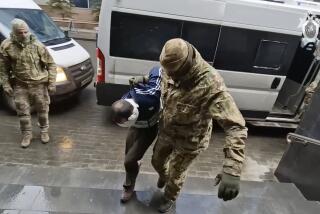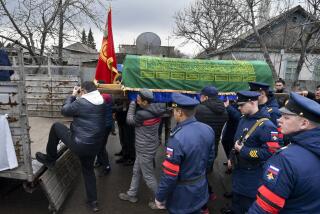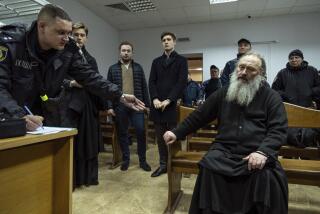Imam’s Death Puts a Region on Edge
- Share via
MOSCOW — The killing of a well-known religious leader by security forces this month in Kyrgyzstan has increased tensions in Central Asia’s densely populated Fergana Valley, which is caught in a spiral of worsening conflict between radical Islamists and authorities.
Mohammed Rafik Kamalov, the popular imam of a mosque in the town of Korasuv, died Aug. 6, reportedly in a shootout between police and the two passengers of his car, who were also killed. Kyrgyzstan authorities allege that the two men were Islamic militants planning terrorist attacks.
In the initial official account of events, Kamalov, a self-proclaimed opponent of violence, was secretly working with Islamic fighters. But many of his supporters asserted that security forces had killed an innocent man.
Authorities then backtracked, saying they did not rule out the possibility that Kamalov had been a hostage.
None of the versions bode well for peace in the Fergana Valley, a fertile region divided between southwestern Kyrgyzstan, eastern Uzbekistan and northern Tajikistan that has an explosive mixture of faith, poverty and anger. The valley, with a population of about 12 million, has long been viewed as the heartland of radical Islam in Central Asia.
On Friday, several thousand people turned out for a protest in Korasuv, demanding that the terrorism accusations against Kamalov be dropped and that he be declared a martyr, the Russian news agency Interfax reported.
“Some of his family members do not believe that Mr. Kamalov was in the same car as terrorists,” Alisher Khamidov, an analyst with the Fergana Research Group, an informal organization of scholars and researchers, said in a telephone interview from Osh, one of the valley’s major cities. “They say he went to a wedding party and was coming back with some guests, not terrorists.... The security people who killed Kamalov haven’t presented credible evidence that he belonged to the extremist organizations they claim.”
The Kyrgyz National Security Service, in a statement reported by Interfax, said that Kamalov was driving a car carrying two militants with the Islamic Movement of Uzbekistan, a guerrilla organization that seeks to establish an Islamic state in Central Asia. It has been blamed for a string of attacks in Uzbekistan since the late 1990s.
The statement said the two slain militants were citizens of Tajikistan suspected of attacking checkpoints on the Kyrgyzstan-Tajikistan border in May.
Korasuv is on the KyrgyzUzbek border, and Kamalov, an ethnic Uzbek, had a large following of worshipers from Uzbekistan who simply crossed a narrow river marking the frontier to attend Friday services.
In interviews conducted at his home and mosque in Korasuv a few days before his death, Kamalov, 53, said it was his duty to encourage people to follow Islamic law.
“You are now able to judge a man by how often he prays in a day,” he said.
The imam sharply criticized Uzbekistan President Islam Karimov, a former communist who runs the country as a strictly secular state. He has been accused by human rights groups of political and religious repression.
Korasuv is about 30 miles east of Andijon, a city in Uzbekistan that was the scene of a violent crackdown on an anti-government uprising in May last year.
That incident began when armed men staged a violent prison break that freed local business leaders who were on trial on charges of Islamic extremism. People gathered in the city’s central square to support the freed prisoners and to voice anger with the government. Subsequently, police and soldiers fired on crowds of both armed and unarmed protesters. The government placed the death toll at 173, although human rights activists and others say hundreds more were killed.
In the interviews, Kamalov drew parallels between Uzbekistan’s suppression of non-official religious activities and the actions of the United States in Iraq, of Israel in Lebanon and of Russia in its fight against Muslim separatists in Chechnya. He expressed support for those who would like to oust the Uzbek president, but said he believed “the Karimov government will not disappear in my lifetime.”
Khamidov, the analyst, said that anger over Kamalov’s death and a security crackdown targeting suspected Islamic militants “is galvanizing the population.” Critics have long warned that attempts to control an Islam resurgence through repression of its more radical adherents risk triggering a backlash.
Authorities in many postSoviet states have particularly targeted Hizb ut-Tahrir, or Party of Liberation, an international organization that mixes fundamentalist beliefs with the call for an Islamic state throughout Central Asia and eventually the entire Muslim world. The party professes an adherence to nonviolence, but authorities allege that it has links to militants.
“Mr. Kamalov has long been considered by the security services as an imam who permitted members of the radical underground Hizb ut-Tahrir to worship at his mosque, and they believed he was a member of Hizb ut-Tahrir,” Khamidov said. “But Kamalov has been known by people here as an imam with liberal views. He openly clashed with Hizb ut-Tahrir.”
For years, Kamalov had openly defended the right of Hizb ut-Tahrir members to attend services at his mosque, insisting that it should be open to any Muslim, while criticizing the group’s ideology. Hizb ut-Tahrir issued a statement from its London office describing Kamalov’s death as an “extrajudicial assassination.”
In the interviews, Kamalov said his Al-Sarakhsi mosque was the frequent target of surveillance by Uzbekistan’s security service and cited a recent attempt to make video recordings with a secret camera. He alleged that Uzbekistan maintained a list of people attending his services, with the aim of imprisoning or fining them.
“It is not just religious persecution, but political,” he said.
Alexei Malashenko, a Central Asia expert at the Carnegie Moscow Center, said that though the situation in the Fergana Valley was “rather explosive,” radical groups were unlikely to achieve the goal of turning the valley into the core of an Islamic state.
“I don’t believe it’s possible, because they are too weak to do it,” he said. “But they are strong enough to organize some kind of revolt.”
*
A special correspondent in Korasuv contributed to this report.
More to Read
Sign up for Essential California
The most important California stories and recommendations in your inbox every morning.
You may occasionally receive promotional content from the Los Angeles Times.













